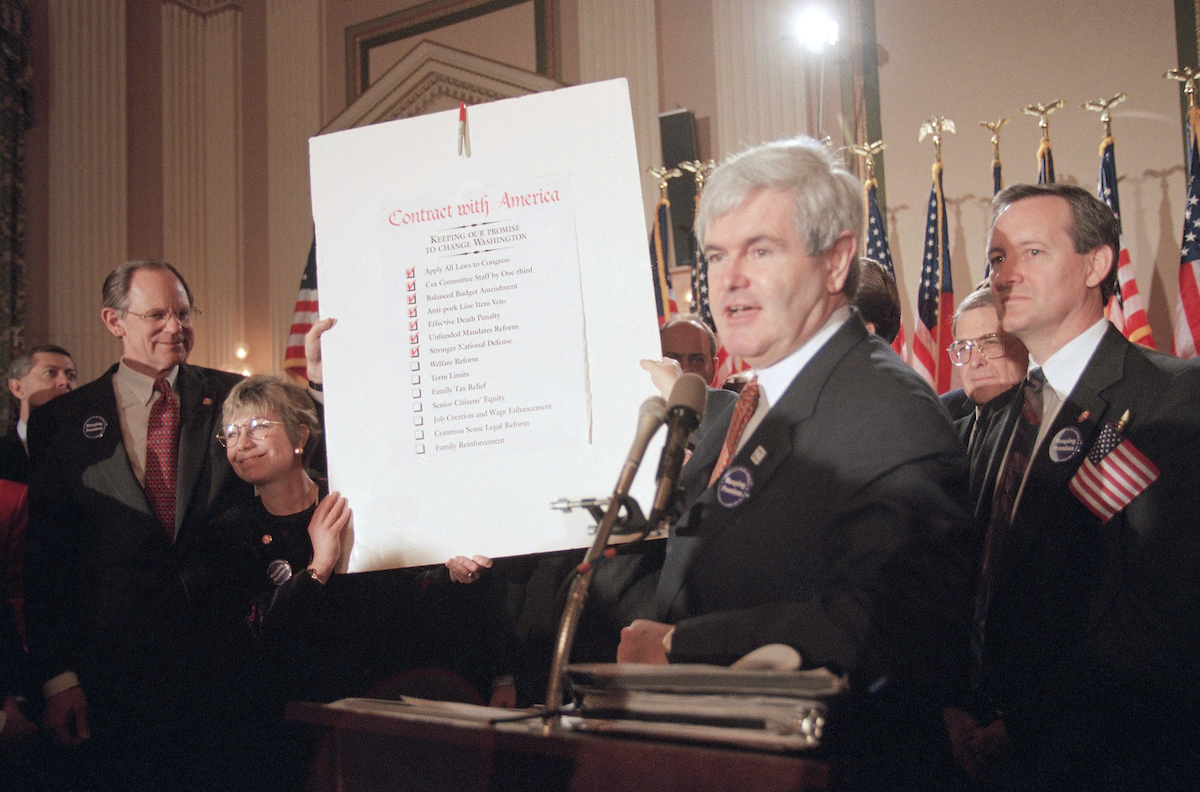’Tis the song, the sigh of the weary,
Hard Times, hard times, come again no more.
Many days you have lingered around my cabin door;
Oh! Hard times come again no more.
—Stephen Foster, 1854
Atlanta Journal and Constitution columnist Colin Campbell, on January 8, 1995, captured the speed of my Gingrich-propelled move from obscurity to momentary notoriety: “George on his Japanese car radio [heard] Newt again, saying, ‘I commend to all of you Marvin Olasky’s The Tragedy of American Compassion. Mellaski goes back for 300 years and…’ ‘What?’ another voice interrupted. ‘Is it Olasky or Mellaski or Alaska or Molasses?’”
Early in 1995, as requests for me to give speeches and interviews accumulated, the Progress and Freedom Foundation (Newt Gingrich’s favorite) moved faster than molasses in offering to pay my salary for the next 20 months. I took a leave of absence from the University of Texas and arrived at PFF’s gorgeous new offices at 1444 Eye Street in Washington’s influence-peddler district. Young staffers, opening box after box of freshly donated desktop computers, told me the Republican Revolution was underway and everything will change.
“Hope so,” I smiled, and referred them to a highlight of British poetry, “The French Revolution as It Appeared to Enthusiasts at Its Commencement.” William Wordsworth, 19 years old when that Revolution began in 1789, wrote:
Bliss was it in that dawn to be alive,
But to be young was very heaven!—Oh! times,
In which the meagre, stale, forbidding ways
Of custom, law, and statute, took at once
The attraction of a country in romance!”
I had three goals for my 20 months. First, see whether Republicans would move beyond merely cutting welfare, and Democrats beyond expanding it. Second, see for myself which local groups were truly helping the poor and maybe inspire others to go and do likewise. Third, talk with journalists about alternatives to our failed war on poverty and point them to groups showing street-level success.
The overall question: Who would promote challenging, personal, and spiritual alternatives to our failed War on Poverty? In The Adventures of Huckleberry Finn, how likely was it that slave Jim would gain his freedom by rafting to New Orleans? In 1995, welfare transformation seemed equally unlikely, given the powerful interest groups that favored the status quo. Austin singer-songwriter Patty Griffin’s “Mad Mission” could have been my theme song:
It’s a mad mission
Under difficult conditions
Not everybody makes it
To the loving cup.It’s a mad mission
But I got the ambition
Mad, mad mission
Sign me up.
Newt greased my access to Republican senators (particularly John Ashcroft, Dan Coats, and Rick Santorum) and representatives (particularly Mark Souder, J.C. Watts, Jim Talent, Sam Brownback, and John Kasich). Confession: I felt what C.S. Lewis warned about in 1944, “the lure of the inner ring,” the excitement of being on the inside during the drafting of legislation.
I sure felt like an inner ringer while dining with Missouri’s John Ashcroft in the genteel Senate dining room with its white tablecloths, polished wood and blue leather chairs, arched windows, uniformed servers, and a stained-glass image of George Washington on horseback. I didn’t yet know enough to order the dining room’s signature navy bean soup with diced ham hocks, but the grilled salmon salad was good and the grilling by Senator Ashcroft congenial.
Later, former Senate Minority Leader Everett Dirksen’s discourse on Senate bean soup educated me: “The succulent little bean … imparts energy and drive to the bean eater and particularly the senators who need this sustaining force when they [speak] well in excess of twenty hours.” As summer began, Ashcroft introduced a bill we had discussed: A person who volunteered at least 50 hours a year to an institution serving the needy could receive a $500 tax credit (not just a deduction) for a contribution to that institution.
Senator Coats and I talked about a bunch of “Project for American Renewal” bills that he would propose. The top priority was a Comprehensive Charity Reform Act that would provide those $500 tax credits for donors to charities that devoted at least 70% of their expenditures to direct anti-poverty services.
The House dining room also had an inner-ring flavor: red curtains, white linens, blue napkins, and a fresco of General Cornwallis surrendering to George Washington. As is typical in Washington, D.C., the fresco was historically inaccurate: Cornwallis said he was sick and sent a substitute, so Washington did the same.
Reps. Watts and Talent introduced a charity tax-credit measure: Their “American Community Renewal Act” would have given individual taxpayers a tax credit of 75 cents for every dollar they contributed to local poverty-fighting organizations, up to $200. To claim the credit, taxpayers would have to volunteer for at least a few hours with the charity, and in that way develop a greater sense of ownership in solving local problems.
One intriguing meeting was with Senate Democratic leader Tom Daschle in his office at 509 Hart Senate Office Building. He and four other senators who joined us had complained that Republicans were intent on “slashing” spending. I proposed a grand compromise. What if the GOP in Congress maintains welfare spending on one condition: that you relinquish your power by allowing community organizations to decide how part of that welfare money would be spent? Daschle replied that experts in Washington knew best.
I asked Daschle to come with me on a three-mile trip: down South Capitol and across the Anacostia River to a community center on Mount View Street (but there’s no mountain to view). There in Anacostia, the poorest part of D.C., he could see retired school staffer Hannah Hawkins’ after-school program for 50 desperate-for-attention children ages five to 15.
Hannah, the widowed mother of five grown children, mothered all 50. The chatter in her run-down building did not stop when once every 15 minutes or so police sirens wailed outside. When a sixth-grader reported getting good grades, Hannah said, “Go ahead, girl.” When a junior high boy threatened another, steely-eyed Hannah reminded him that “people who pick fights end up either dead or in jail.”
Hannah called her program Children of Mine because she insisted that social progress came not when professionals took on needy children as clients but when ordinary people treated semi-abandoned children from all races as their own. A repeated scene: Hannah stopping a child running by and asked, “Do you have homework?” “Yes, ma’am.” “Then sit down. We can’t have you running back and forth, can we?” “No, ma’am.”
A strong Christian belief underlay Hannah’s willingness to serve and keep serving: “Without Jesus you’re empty. You’re just out to sea, floating, and don’t know where to go.” To keep going, she gleaned food, books, and shoes from local businesses and churches. She unabashedly answered phone calls: “Excuse me. Children of Mine. Yes, I need me some dough re me.” Glancing at some financial records, she added, “We are flying on a wing and a prayer. Tell your neighbors to wake up little Susie.”
I told Daschle some of Hannah’s stories about those who say they help the needy—“But they’re really the greedy.” She described wealthy but program-poor organizations that asked her to bring several dozen children on particular days when donors were around. They did not want their fat-cat facilities to look like ghost towns: “When I first started, I used to go because I didn’t know nothing,” Hannah said. “Now I’m well-seasoned. I see the pimping of these children, and I will not have any part in it.”
Every time I visited Hannah, she was persevering in her goal of bringing children “from disgrace to grace.” When she told a preteen, “Your armpits stink. Wash them before you come tomorrow,” the boy meekly said, “Yes, ma’am.” Later I asked him why he obeyed her. He said the other adults he knew were selfish, but “Miz Hawkins wants what’s best for me.” She acknowledged her rough edges: “I ain’t easy to deal with, but my children know I love them and care about them.”
I didn’t tell Daschle that his armpits stunk (they did not), and he did not say that to me (they may have). But he never, to my knowledge, visited Children of Mine. Neither he nor his colleagues moved from a Big Government position. On the other side of the aisle, Republicans ignored a famous song’s advice about accentuating the positive and eliminating the negative.
In fact, many insisted on accentuating the negative—ending Aid to Families with Dependent Children (AFDC), for example—but were uninterested in Dan Coats’ package of positives. Many felt pressure from their affluent suburban constituents and did not have inner-city districts featuring heavy welfare use. Christian Coalition and National Association of Evangelicals leaders supported tax credits, but they didn’t make it a priority.
Congress in 1995, with Republican majorities, passed a limited bill that replaced AFDC with Temporary Aid to Needy Families (TANF). It stipulated that at least half the recipients had to be working (in a variety of ways) and that most recipients could be on cash assistance for no more than five years. President Bill Clinton vetoed it.
To be continued.

